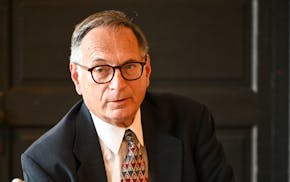A member of Mount Zion Temple in St. Paul sought the rabbi's advice about a problem employee.
The employee's shoddy work was costing the company money and she should be fired. But then she would lose her health insurance, and she and her husband would have trouble finding other coverage because of their poor health.
What should the supervisor do? Keep her on the job and put the company at risk, or fire her and put her and her husband at risk?
As the health care debate grinds through Congress, Rabbi Adam Spilker and other Twin Cities clergy are increasingly finding themselves on the front lines, pushed to define the moral imperative of health care and what services America should provide for its people.
"We all think that it is a moral issue," the Rev. Peg Chemberlin, executive director of the Minnesota Council of Churches and president-elect of the National Council of Churches, told a recent convention of religion reporters. "But when it comes to promoting a particular political agenda, that's not our role."
Playing politics
From the Christian parable about the Good Samaritan to the Jewish practice of mitzvah, every major religion has a tenet about caring for those who need help. While most religious leaders consider health care to fall under that category, they differ on what action is required.
Rather than take a specific position, Bishop Sally Dyck of the Minnesota Conference of the United Methodist Church sent a letter last month encouraging member churches to host forums exploring the health care issue in depth. "Like at election times, a partisan approach is not appropriate," she said. "Our place is to educate people about the issues."
Some churches oppose a government solution for health care. "It's not an issue of caring," said the Rev. Frank Page, former president of the Southern Baptist Convention. "It's an issue of government intrusion. When the government gets involved in something, it rarely does it well."
It is the role of politicians to find a compromise, said Spilker in a recent sermon. Spilker reminded his congregation that while the synagogue has a statement supporting efforts to make comprehensive health care more accessible, "This statement does not link us to any political agenda necessarily; it links us to our values of priorities, of protecting the widow, the orphan and stranger -- or today, protecting those who are unable to get insurance."
Agreeing to disagree
Despite the reluctance to play politics, the religious community has taken sides on specific issues.
The Christian Scientists want an allowance for spiritually based healing, while the American Atheists demand that such an allowance be excluded.
Abortion and reproductive health are major points of contention.
The Roman Catholics, Southern Baptists and Lutheran Church-Missouri Synod, among others, say they will not support a bill that includes abortion coverage. In his column in the newspaper of the Archdiocese of St. Paul and Minneapolis, Archbishop John Nienstedt said that he and the U.S. bishops support a health care overhaul, but not at the cost of "the values that we hold dear."
He also insisted that the bill not include euthanasia, "either actively prescribed or passively encouraged."
But the United Church of Christ, without mentioning reproductive rights per se, demands that the bill include "a full set of benefits." An open letter reminding Congress of "the moral imperative of ensuring access to affordable reproductive health services" is being circulated by the Religious Institute on Sexual Morality, Justice and Healing, with more than 1,100 signatures from clergy from American Baptist to Unitarian Universalist.
Fighting fair
Despite their other differences, religious leaders agree that the matter is too important to be decided by deceptive tactics such as recent misstatements that the bill would mandate circumcision (Rush Limbaugh) and that nearly three-fourths of the voting public supports the bill (Michael Moore).
The Rev. Jim Wallis, president of the evangelical group Sojourners, has launched a campaign encouraging members of all faiths to send e-mails to political commentators demanding that they quit "bearing false witness."
Spilker said that it's time to quit arguing about differences and start reconciling them. Not that finding the answers is going to be easy.
Remember the person in a moral quandary over the unproductive employee?
Nearly a month after posing the issue to Spilker, they're still searching for a way out of the dilemma.
Jeff Strickler • 612-673-7392
One day in the frantic life of a Children's Minnesota emergency room nurse
State Sen. Nicole Mitchell off committee assignments while case under review

GOP endorses Tad Jude for congressional seat Dean Phillips is leaving
